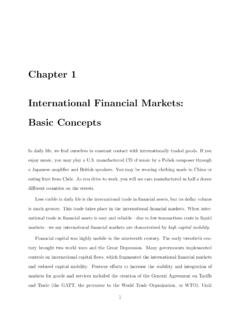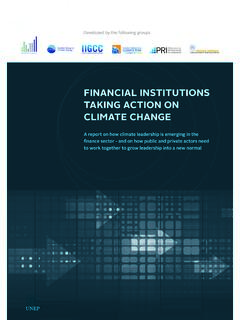Transcription of Financial-Markets-and Climate Transition
1 SUSTAINABLE AND RESILIENT FINANCEOECD Business and Finance Outlook 2020 The OECD Business and Finance Outlook is an annual publication that presents unique data and analysis on the trends, both positive and negative, that are shaping tomorrow s world ofbusiness, finance and investment. The COVID 19 pandemic has highlighted an urgent need toconsider resilience in finance,both in the financial system itself and in the role played bycapital and investors in making economic and social systems more dynamic and able towithstand external shocks. Using analysis from a wide range ofperspectives, this year s edition focuses on the environmental, social and governance (ESG) factors that are rapidly becoming a part ofmainstream finance. It evaluates current ESG practices, and identifies priorities and actions tobetter align investments with sustainable, long term value in particular, the need for more consistent, comparable andavailable data on ESG *diefgj+PRINT ISBN 978-92-64-38456-9 PDF ISBN 978-92-64-54453-6 SUSTAINABLE ANDRESILIENT FINANCEOECD Business andFinance Outlook 2020 financial Markets and Climate TransitionOpportunities, Challenges and Policy Implications 1 financial MARKETS AND Climate Transition This document is published under the responsibility of the Secretary-General of the OECD.
2 The opinions expressed and arguments employed herein do not necessarily reflect the official views of OECD member countries. This document, as well as any data and map included herein, are without prejudice to the status of or sovereignty over any territory, to the delimitation of international frontiers and boundaries and to the name of any territory, city or area. OECD 2021 financial Markets and Climate Transition Opportunities, Challenges and Policy Implications PUBE 2 financial MARKETS AND Climate Transition This document is published under the responsibility of the Secretary-General of the OECD. The opinions expressed and arguments employed herein do not necessarily reflect the official views of OECD member countries.
3 This document, as well as any data and map included herein, are without prejudice to the status of or sovereignty over any territory, to the delimitation of international frontiers and boundaries and to the name of any territory, city or area. OECD 2021 OECD (2021), financial Markets and Climate Transition : Opportunities, Challenges and Policy Implications, OECD Paris, 3 financial MARKETS AND Climate Transition Foreword The accelerating threat of Climate change raises the urgency of commitment to Climate Transition , including the important role of global financial markets to align investment with net zero. This report focuses on the critical contribution financial markets must play towards achieving an orderly Transition to low-carbon economies, and the policies needed to support this.
4 Although financial markets are beginning to integrate Climate Transition risks and opportunities into investment decision making, a number of constraints are preventing the scaling up of investment to foster orderly transitions to low-carbon economies. Notably, insufficient data, financially material metrics and analytical tools to measure and manage Climate Transition risks remain critical constraints for corporates and financial institutions , which calls for greater attention to policy considerations. This report on financial Markets and Climate Transition explores the key elements that could factor into market pricing of Climate Transition risks and opportunities, from stranded assets and production processes to renewables Transition strategies.
5 It offers frameworks and case studies to understand how facets of the Transition can affect market pricing. In addition, the report reviews the growing range of market products and practices that have emerged to more efficiently channel capital to price and manage opportunities and risks from Climate Transition . The report puts forward policy options that can support this Transition by helping markets incorporate price changes and by incentivising companies to take measures that address Climate -related risks and opportunities over time. The report is part of a multi-year body of work by the OECD Committee on financial Markets to consider aspects of market resilience as governments and financial market participants address the challenges of the Transition to low-carbon economies.
6 4 financial MARKETS AND Climate Transition Acknowledgements This report has been prepared by Catriona Marshall, and Riccardo Boffo, with inputs from Giulio Mazzone, under the supervision of Robert Patalano, from the financial Markets Division of the OECD Directorate for financial and Enterprise Affairs. Pamela Duffin and Ed Smiley provided editorial and communication support. The report supports the work of the OECD Committee on financial Markets, and analysis and content from the report was discussed by the Committee in October 2020 and April 2021. The authors are grateful for valuable inputs in the form of boxes and constructive feedback from delegates in the OECD Committee on financial market , including the Bank of England, Banque de France, French Treasury, Bank of Greece, Banca d Italia, Italian Ministry of Finance, Japan financial Services Agency, Japan Ministry of Economy Trade and Industry, Japan Ministry of Environment, BI Norwegian Business School, Norges Bank, De Nederlandsche Bank, Swiss State Secretariat of International Finance, European Central Bank, and the European Securities and Markets Authority.
7 The authors are grateful for valuable guidance from Aerdt Houben, Chair of the OECD Committee on financial Markets (De Nederlandsche Bank) and Matthew Cranford (United States Department of Treasury) which enriched the report. In addition, the report has benefited from feedback from the following OECD experts: Robert Youngman, Dirk R ttgers, Geraldine Ang, Mireille Martini, and Aayush Tandon from the Environment Directorate, and Dominique Blaquier from the Development Co-operation Directorate. 5 financial MARKETS AND Climate Transition Preface Climate change is accelerating. Now more than ever, ambitious and effective global action to address the impacts and future risks of the Climate crisis is critical and urgent.
8 Recent momentum behind governments Climate commitments is encouraging. However, turning increased political ambition on Climate emergency into outcomes that ensure a net-zero Transition by 2050 remains the major challenge. Climate finance continues to grow, yet at the end of 2019, developed countries remained USD billion short of meeting the goal of mobilising USD 100 billion a year to support developing countries green transitions. A growing number of corporates, financial institutions and institutional investors are also making increasing efforts to assess physical and Transition risks, and to publish Climate Transition plans to achieve net-zero emissions. In turn, financial markets are beginning to integrate Climate Transition risks and opportunities into investment decision making.
9 Despite this progress, market participants remain constrained in ways that prevent the needed scaling up of investment to foster an effective and efficient Climate Transition . There is a lack of progress on globally coordinated carbon pricing. In addition, the Task Force on Climate -related financial Disclosure (TCFD) has advanced disclosure of Climate -related financial information, but data gaps and incomparable metrics continue to hinder portfolio reallocation decisions and effective pricing of capital. Lack of transparency and comparability of environmental, governance and social (ESG) rating methodologies, as well as inconsistent measurement of Climate Transition factors in environmental pillar scores, further impede portfolio allocations that better align with net-zero pathways.
10 Addressing these challenges will require a thorough reset of the financial system by incorporating Climate risks and opportunities across relevant aspects of central banking, supervision, regulation, and market practices for making investment decisions. This includes identifying policies to address biased incentives, capability gaps and inadequate Climate risk disclosure that impede a substantial scaling up of low-emissions, resilient investments. There are significant opportunities to dramatically reduce emissions, shift away from carbon-intensive activities and promote green growth. financial markets across advanced and developing economies have a critically important role to play in helping to achieve these ambitious Climate objectives every step of the way on our path to net zero.
















